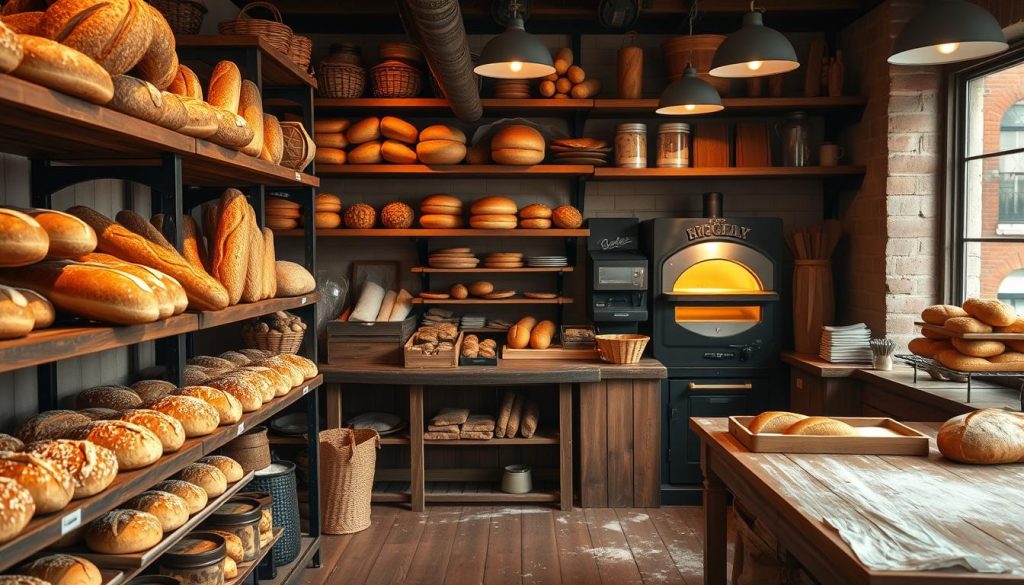Artisan baking is a time-honoured tradition. It’s all about the craftsmanship and making exceptional handcrafted bread. In the UK, these skilled bakers focus on quality. They use techniques that highlight flavour and texture, making their bread unique and loved by all.
This section shows the art of making handcrafted bread. It sets the stage for a deeper look into the skills and practices of artisan bakers. They bring a special touch to their work, making each loaf a masterpiece.
The Art of Artisan Baking
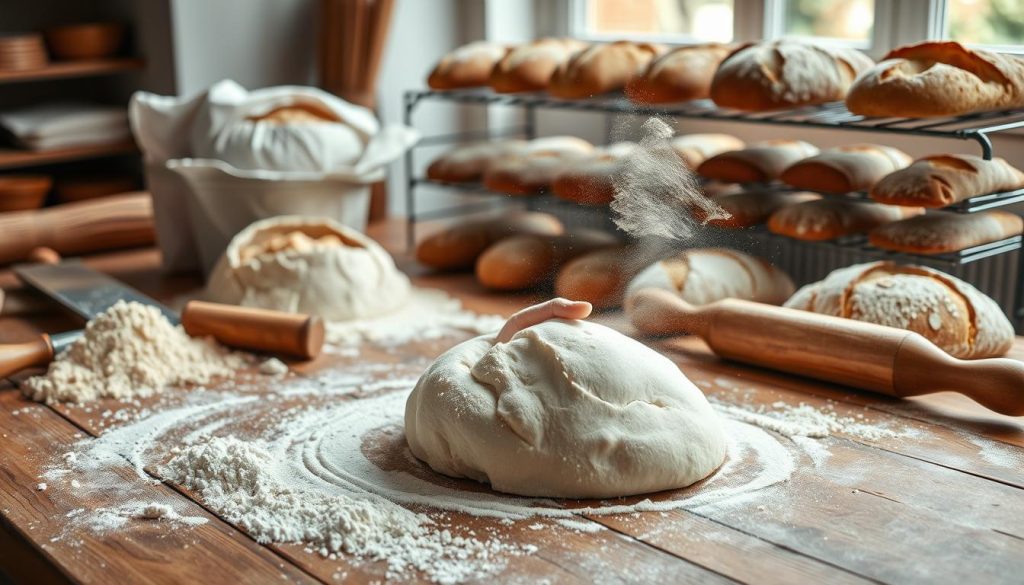
Artisan baking is all about skill and craftsmanship. It’s a way to make bread that’s full of creativity and tradition. By using special techniques, bakers make bread that tastes amazing and has a unique character.
Understanding Artisan Techniques
Artisan baking uses many techniques to make bread special. Long fermentation times give the dough a deep flavour. This makes the bread taste better.
Techniques like sourdough make the bread tangy and add to its quality. Shaping bread, like making croissants, shows the skill of the baker.
The Role of Quality Ingredients
Quality ingredients are key to great artisan bread. Using organic flour, fresh yeast, and local produce makes a big difference. It gives the bread a unique taste and texture.
Using seasonal ingredients also supports local farmers. This makes the bread not just delicious but also good for the environment.
Meet the Finest Bakers in the UK
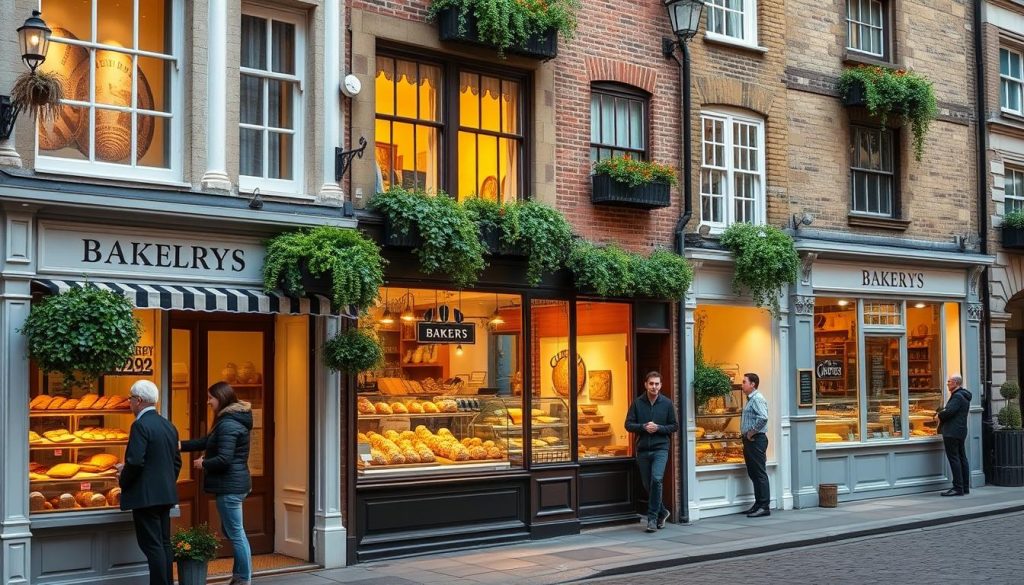
The UK is home to a lively artisan baking scene. Many famous bakeries lead the way in making exceptional bread. Visitors can check out the top bakeries. Each one offers unique treats that show off British baking traditions. Here are some bakeries and the talented people behind them.
Top Bakeries to Visit
- Bread Ahead – This London bakery is known for its sourdough loaves and doughnuts. It draws in both locals and tourists.
- The Flour Station – This place is famous for its handcrafted bread and pastries. They focus on using top-quality ingredients and traditional ways of making bread.
- St. John Bakery – This bakery is all about sourdough. It’s loved for its straightforward approach to baking.
Profiles of Leading Artisan Bakers
Many famous UK bakers have changed the industry. They mix tradition with new ideas. Their stories show a deep love for their craft and a commitment to quality.
- Richard Bertinet – An expert in French baking, his Bath bakery is known for its artisanal bread classes and deep knowledge.
- Jules Goukens – At Maison Mayci, he combines French artisan bread with modern style. He highlights seasonal tastes.
- Mark Varney – He’s a key figure at the Real Bread Campaign. Varney promotes better food practices and raises baking standards.
Baker: A Craftsperson’s Journey
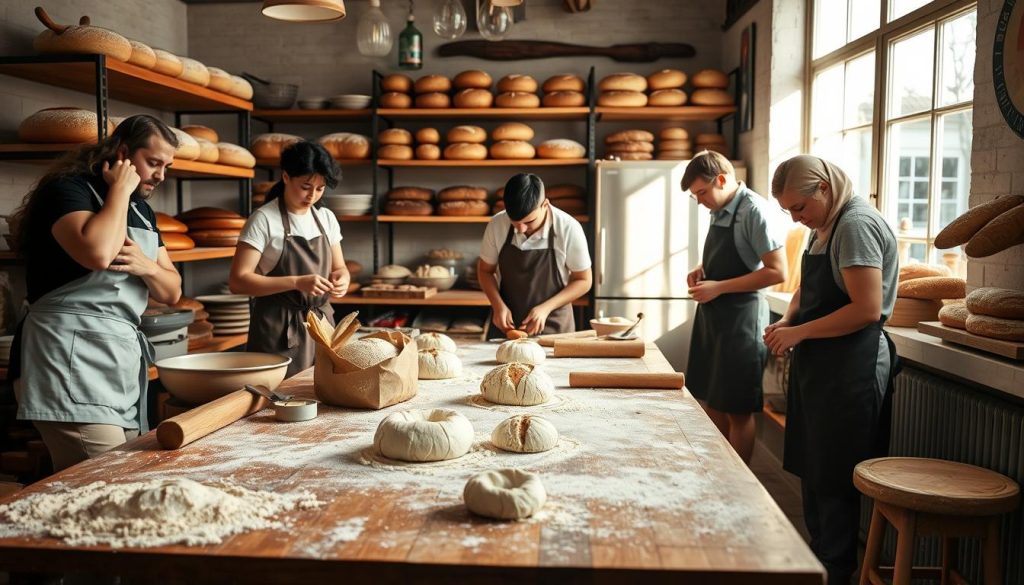
Becoming an artisan baker takes different paths, each offering unique experiences. People often choose formal training at baking schools or apprenticeships. These choices give hands-on learning with experts. They teach the key skills and trade secrets.
Training and Apprenticeships
Baking apprenticeships offer a structured way for new bakers to improve. They cover technical skills and creativity. Places like Gail’s Bakery and Paul Hollywood’s Bread provide mentorship. This helps keep the tradition of artisan baking alive.
Skills and Techniques of a Successful Baker
Being a good baker is more than just mixing ingredients. It’s about managing time, being precise, and knowing about flavours and techniques. Skills like handling dough, fermentation, and controlling baking temperatures are crucial. The baking world changes often, so bakers must keep learning to stay ahead.
The Importance of Handcrafted Bread
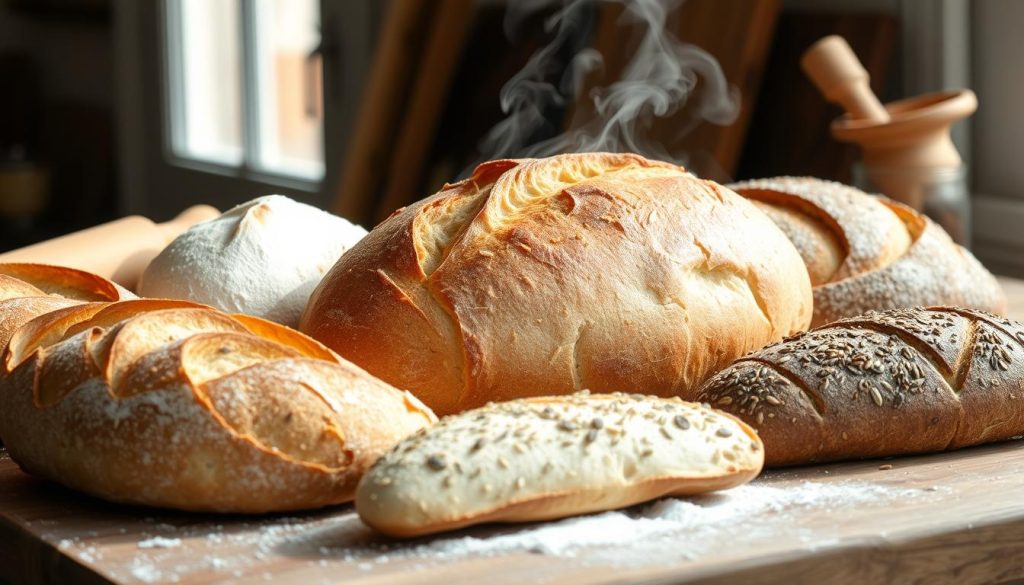
Choosing handcrafted bread has many benefits over mass-produced types. It has a better taste and more nutrients. This method focuses on quality and care, showing the baker’s skill. Unlike mass-produced bread, it connects us to our culinary past.
Benefits of Handcrafted Over Mass-Produced
Handcrafted bread has several advantages:
- It has rich and varied flavours, showing the baker’s unique style.
- The texture is often better, with a nice crust and soft inside.
- It’s more nutritious because of the quality ingredients and natural process.
- It uses fewer preservatives and artificial additives than mass-produced bread.
How Handcrafted Bread Celebrates Tradition
Traditional baking is more than just food making; it’s about keeping a cultural tradition alive. Handcrafted bread uses old techniques passed down through generations. It connects people through shared experiences. Each loaf shows the hard work of skilled bakers and their love for traditional methods.
Enjoying handcrafted bread helps us appreciate the effort put into it. It makes each bite a celebration of history and culture.
Diverse Bread Varieties
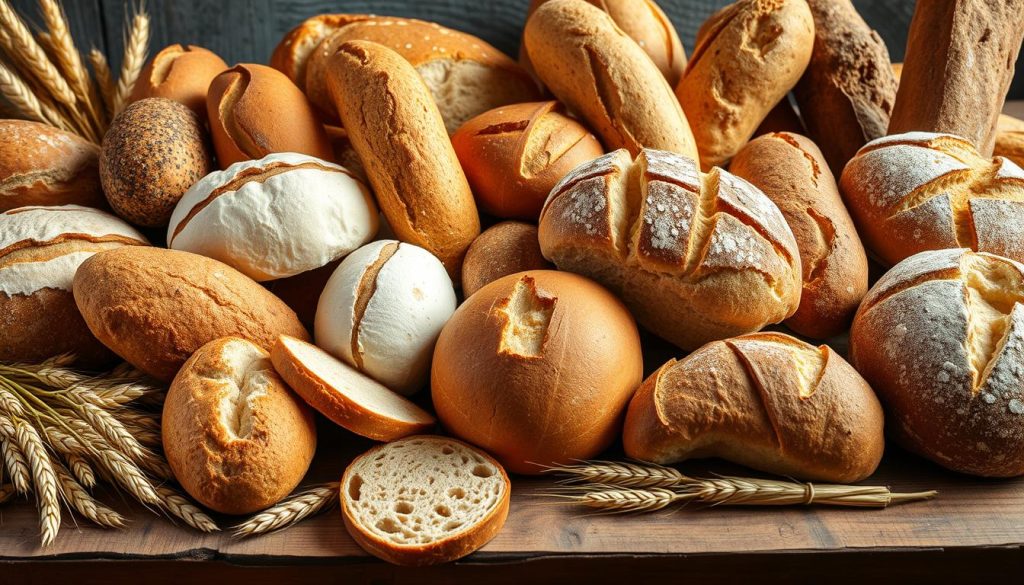
The world of bread is vast and varied, filled with flavours and textures that show tradition and innovation. British breads are known for their unique tastes and textures. They blend well with international breads, showing the world’s culinary diversity. This mix makes the UK’s baking scene exciting, with bakers bringing in new flavours from across the globe.
Classic British Breads
Classic British breads are loved in homes and bakeries. Some top ones are:
- Sourdough: Known for its tangy taste and chewy crust.
- Granary: Made with wholemeal flour, it has a hearty texture.
- White Bloomer: A soft, crusty loaf great for sandwiches.
- Hovis: Famous for its naturally fermented loaves.
These breads tell stories of local ingredients and long-standing baking traditions.
International Breads and Their Unique Flavours
International breads offer a world of tastes and textures. Some standouts are:
- Baguette (France): A crispy, long loaf with a soft inside.
- Ciabatta (Italy): Known for its rustic look and open crumb.
- Pita (Middle East): A round bread perfect for dips.
- Naan (India): A leavened flatbread, often eaten with curries.
These international breads add to the UK’s bread diversity. They let locals taste the flavours of different cultures. The sharing of baking skills and recipes keeps British baking exciting, celebrating a mix of styles.
Health Benefits of Artisan Bread
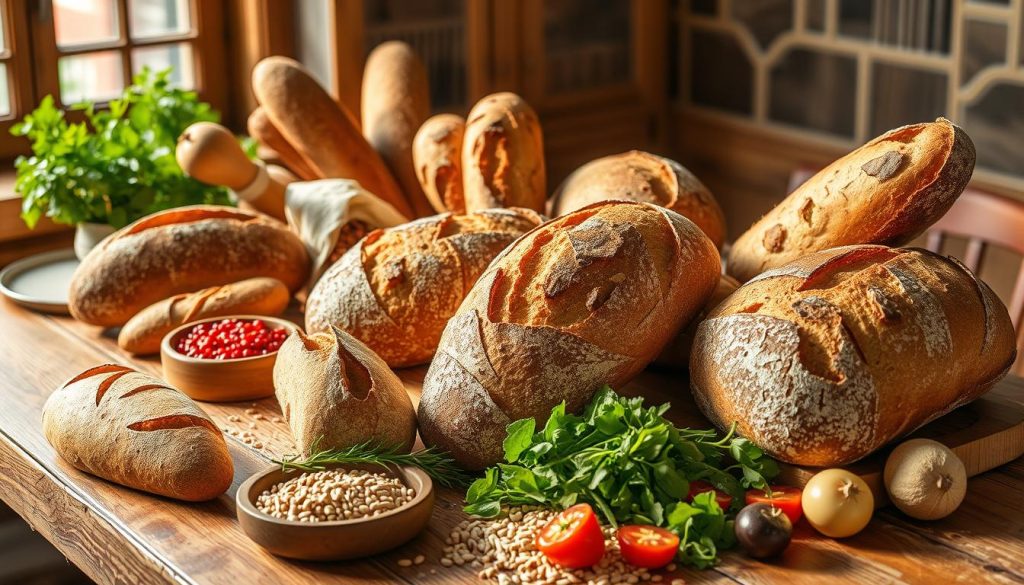
Artisan bread is packed with health benefits, thanks to its natural ingredients. It’s made with top-quality, unrefined parts. This makes it a great choice for a balanced diet.
Nutritional Advantages of Natural Ingredients
Artisan bread uses simple, whole ingredients. This boosts its nutritional value. The main benefits are:
- More fibre, vitamins, and minerals.
- Less additives and preservatives for healthier eating.
- Better taste and smell for a nicer meal.
Digestibility and Gluten Content
Artisan bread making uses longer fermentation. This makes gluten easier to digest. It can also lower gluten in the bread. Sourdough and wholegrain types are especially good for health.
- It’s easier to digest, good for those with mild gluten issues.
- It has a lower glycemic index, helping with blood sugar control.
- It has probiotics that are good for gut health.
Innovative Bread Flavours and Ingredients
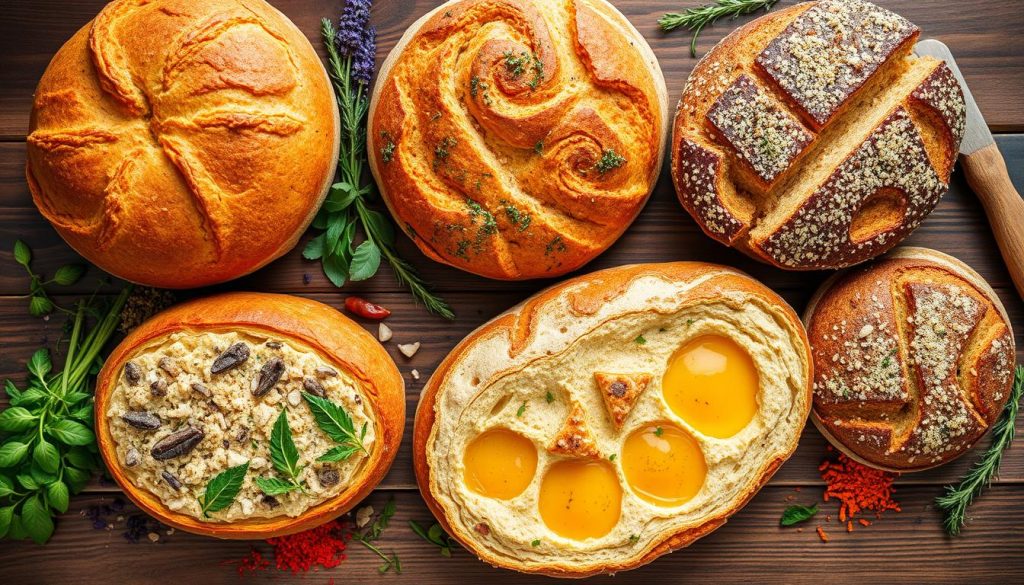
The world of artisan baking is always changing, thanks to new trends. Today, bakers use unique ingredients to make breads that excite our taste buds. They add spices and special fruits to traditional recipes, offering a new experience.
Exploring Unconventional Additives
Many bakers are trying out new ingredients. These ingredients make the breads taste better and suit different tastes. Some popular choices are:
- Herbs like rosemary and thyme for a savoury touch
- Spices such as cinnamon and cardamom for warmth and depth
- Nuts and seeds to provide crunch and nutrition
- Fruits like figs and cranberries for a sweet twist
These unique ingredients lead to amazing bread flavours. They grab attention and take baking to new levels.
Seasonal Ingredients in Bread Making
Using seasonal ingredients is key to making fresh and tasty bread. By choosing the best ingredients, bakers help local farmers and offer quality breads. Seasonal ingredients include:
- Pumpkins in autumn for hearty loaves
- Spring greens for light and lively breads
- Berries during summer for vibrant and fruity varieties
- Root vegetables in winter for warming flavours
Seasonal ingredients make bakers and their communities closer. This enriches the baking experience.
Sustainable Practices in Artisan Baking
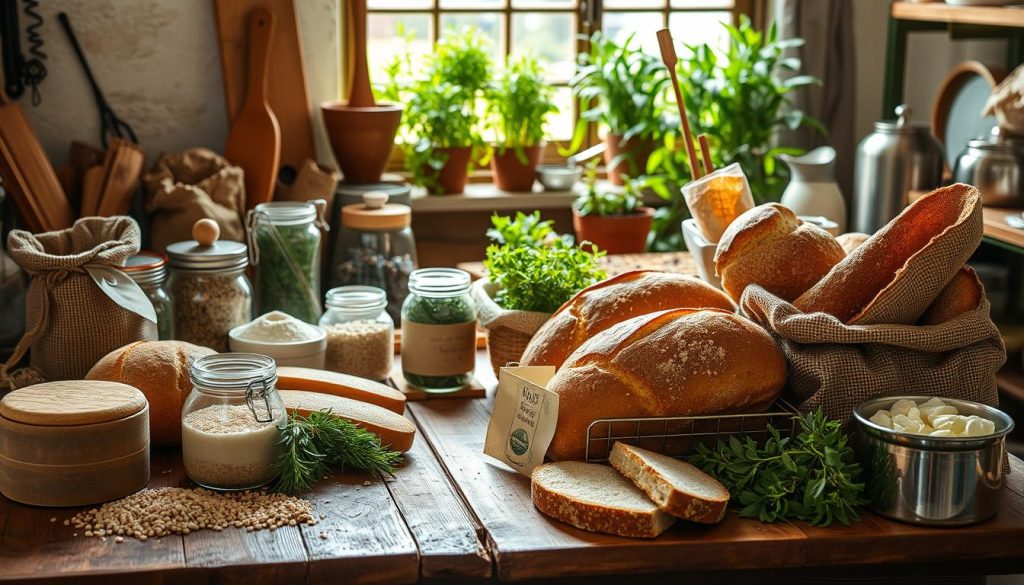
Artisan bakeries are now focusing on sustainable baking to lessen their impact on the environment. They aim to cut down on food waste during the baking process. By using smart strategies, they save resources and set an example for the industry. They also help create a circular economy by reducing waste.
Reducing Waste in the Baking Process
Artisan bakers use creative ways to fight food waste. For example:
- They turn stale bread into breadcrumbs or croutons.
- They plan their production based on what people will buy.
- They give away unsold items to local charities, helping the community and cutting waste.
Locally Sourced Ingredients and Their Impact
Buying ingredients locally is key to sustainable baking. It cuts down on transport emissions and means fresher products. It also builds community ties and supports local economies. Plus, it helps the environment by promoting diverse farming practices.
Community and Artisan Bakeries
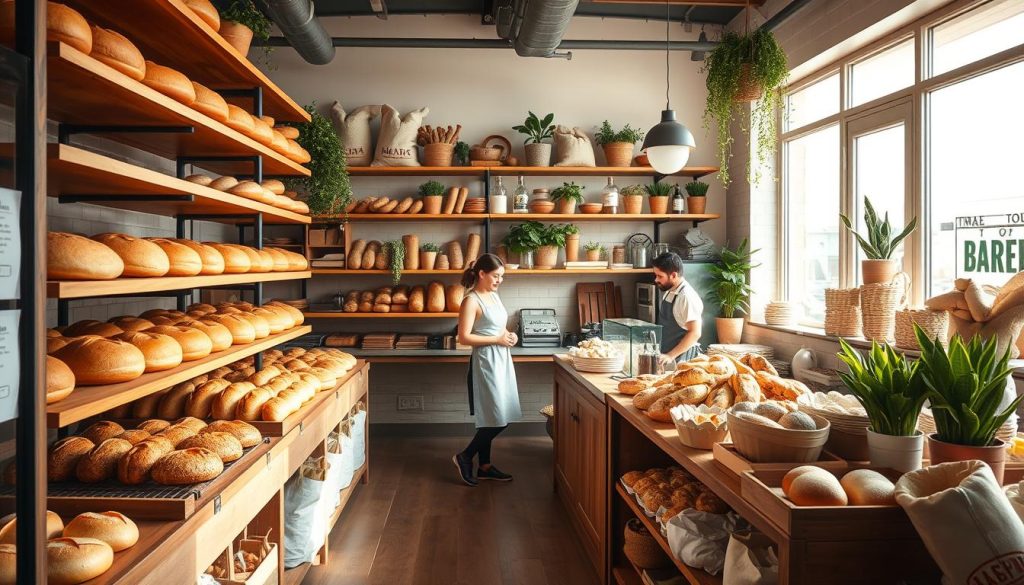
Artisan bakeries are key to their local communities. They bring people together and offer fresh, quality products. These places become spots where neighbours meet, share stories, and enjoy handcrafted treats. They build a sense of belonging in the community.
The Role of Bakeries in Local Communities
Community bakeries do more than just sell bread and pastries. They are important for several reasons:
- They create jobs and help the local economy.
- They support sustainable practices by using local ingredients.
- They bring people together through shared activities.
Events and Workshops Hosted by Bakers
Artisan bakers connect with their communities in many ways, like:
- Baking workshops that teach artisan skills.
- Seasonal events celebrating local produce and crafts.
- Collaborations with local artists or producers for unique products.
These workshops not only teach people about bread-making. They also build community bonds, encouraging teamwork and creativity.
Choosing the Right Bakery for You
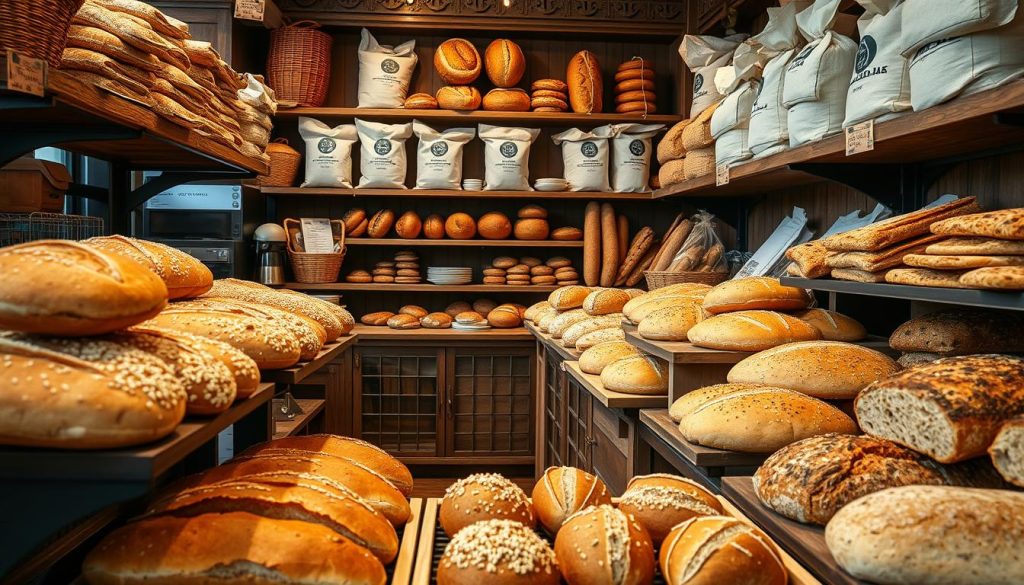
Finding the perfect bakery means looking at several important factors. You want to make sure it matches your taste and what you expect. Key elements play a big part in making the experience enjoyable and the products top-notch.
Factors to Consider When Selecting a Bakery
When picking a bakery, think about these key points:
- Product Variety: A wide selection of bread and pastries shows the bakery’s skill.
- Quality of Ingredients: Look for natural and high-quality ingredients for better taste and health benefits.
- Customer Service: Friendly staff make shopping better and offer great advice.
- Cleanliness and Atmosphere: A clean, welcoming place shows the bakery’s dedication to quality.
- Community Involvement: Bakeries that support local events or produce are more appealing to those who care about the community.
What Makes a Bakery Stand Out
What makes a bakery special can make the search fun:
- Signature Items: Special items or flavours make a bakery worth checking out.
- Artisan Techniques: Traditional baking methods improve flavour and texture.
- Seasonal Offerings: Bakeries that use seasonal ingredients offer fresh and exciting choices.
- Community Feedback: Good reviews and local recommendations can help you find great bakeries.
By carefully looking at these points, you can find a bakery that fits your needs and tastes. The right choice means better quality baked goods and a more enjoyable experience.
Baking at Home: Tips from the Experts
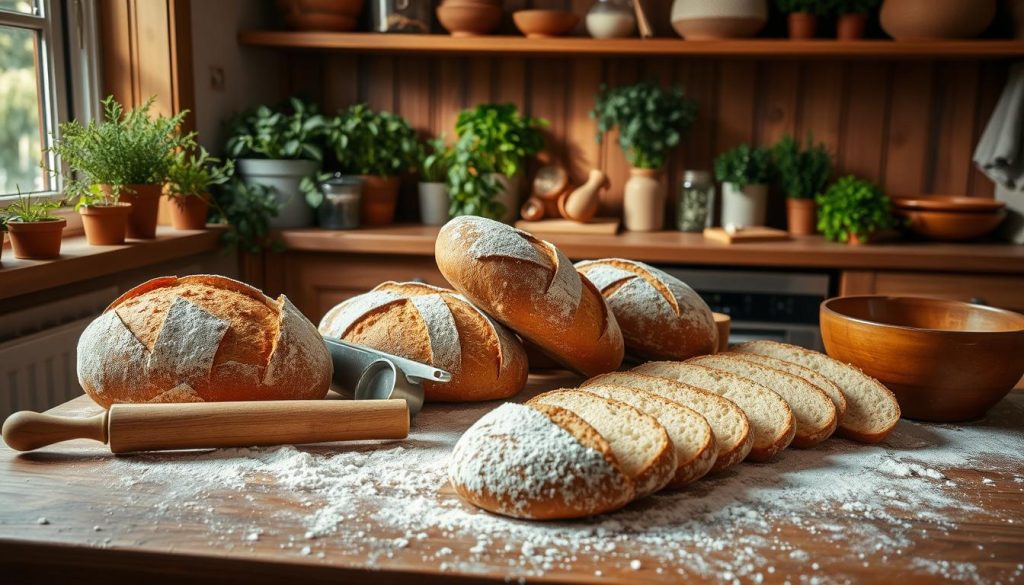
Starting with artisan baking can be exciting. Having the right tools and recipes is key. Essential equipment is crucial for making delicious, handcrafted loaves. Here’s a guide to must-have equipment and simple artisan bread recipes to spark your baking passion.
Essential Equipment for Home Baking
Setting up your kitchen for baking is vital. Add these items to your collection:
- Mixing bowls of various sizes for dough preparation
- Stand mixer or hand mixer to simplify kneading
- Baking stones for achieving a perfect crust
- Proofing baskets to help shape the dough
- Measuring cups and spoons for precision
- Thermometer for checking water temperature
- Silicone baking mats or parchment paper for easy cleanup
Beginner’s Guide to Artisan Bread Recipes
With the right equipment, it’s time to try artisan bread recipes. Here are a couple of simple options to begin with:
- Basic White Bread: Mix flour, yeast, salt, and water. Knead until smooth, let it rise, shape it, and bake.
- Rustic No-Knead Bread: Combine flour, salt, yeast, and water; let it sit overnight before baking for a crusty, artisan-style loaf.
The Future of Artisan Baking
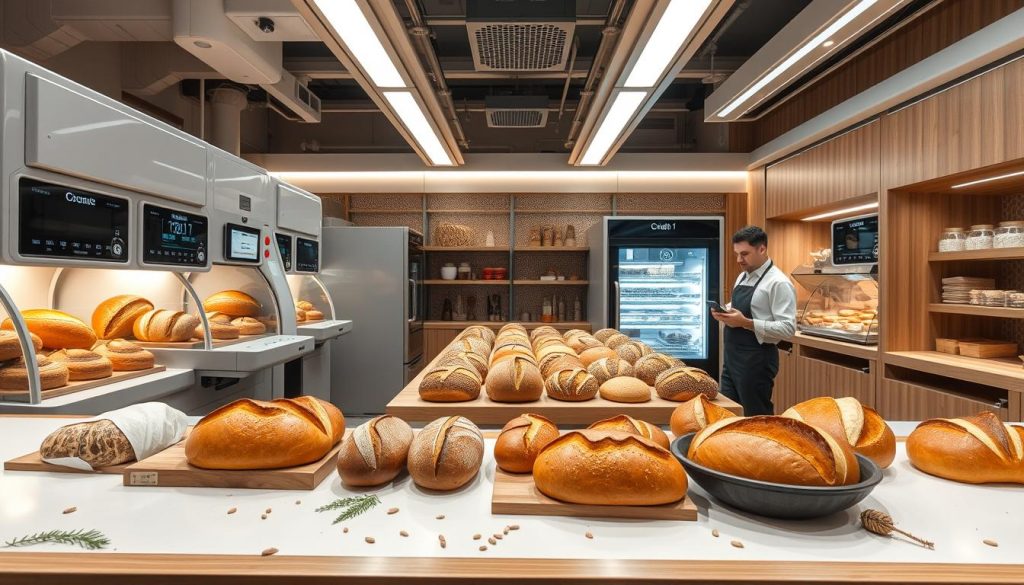
The future of baking is changing fast, with new trends and tech making waves. Consumers want unique tastes, so bakers are using more plant-based and gluten-free ingredients. They’re also trying new ways to make traditional recipes more exciting for today’s diverse tastes.
Trends Shaping the Baking Industry
Artisan baking is evolving with a focus on health and variety. The main trends are:
- Using ancient grains for more nutrition.
- Adding international flavours for the adventurous eaters.
- Choosing local and organic ingredients for sustainability.
The Impact of Technology on Artisan Baking
Technology is changing the game for traditional bakeries. New machines make things faster without losing the personal touch. Online shops let bakers reach more people, making it easy for customers to buy from home. This tech boost helps bakers grow while keeping their products special.
Understanding Bread Regulations and Standards
In the United Kingdom, bread regulations are key to keeping baked goods safe and of high quality. These rules help protect consumers and support artisan bakeries. They ensure that bakeries meet the high standards customers expect, building trust through consistency and reliability.
Quality Assurance in Artisan Bakeries
Artisan bakeries must meet strict standards in baking. This means choosing top-quality ingredients and following careful baking steps. Regular checks and evaluations help bakeries follow the rules and aim for excellence. This focus on quality makes customers trust the safety and health benefits of their bread, meeting bread regulations.
Labeling and Health Regulations for Breads
Labeling and health standards are crucial in baking. They make sure customers know what’s in their bread and if it might cause allergies. Rules cover nutritional facts and ingredient lists, helping people make better choices. Following these health standards boosts a bakery’s reputation and shows a strong commitment to customer safety and health in the changing world of artisan baking.

